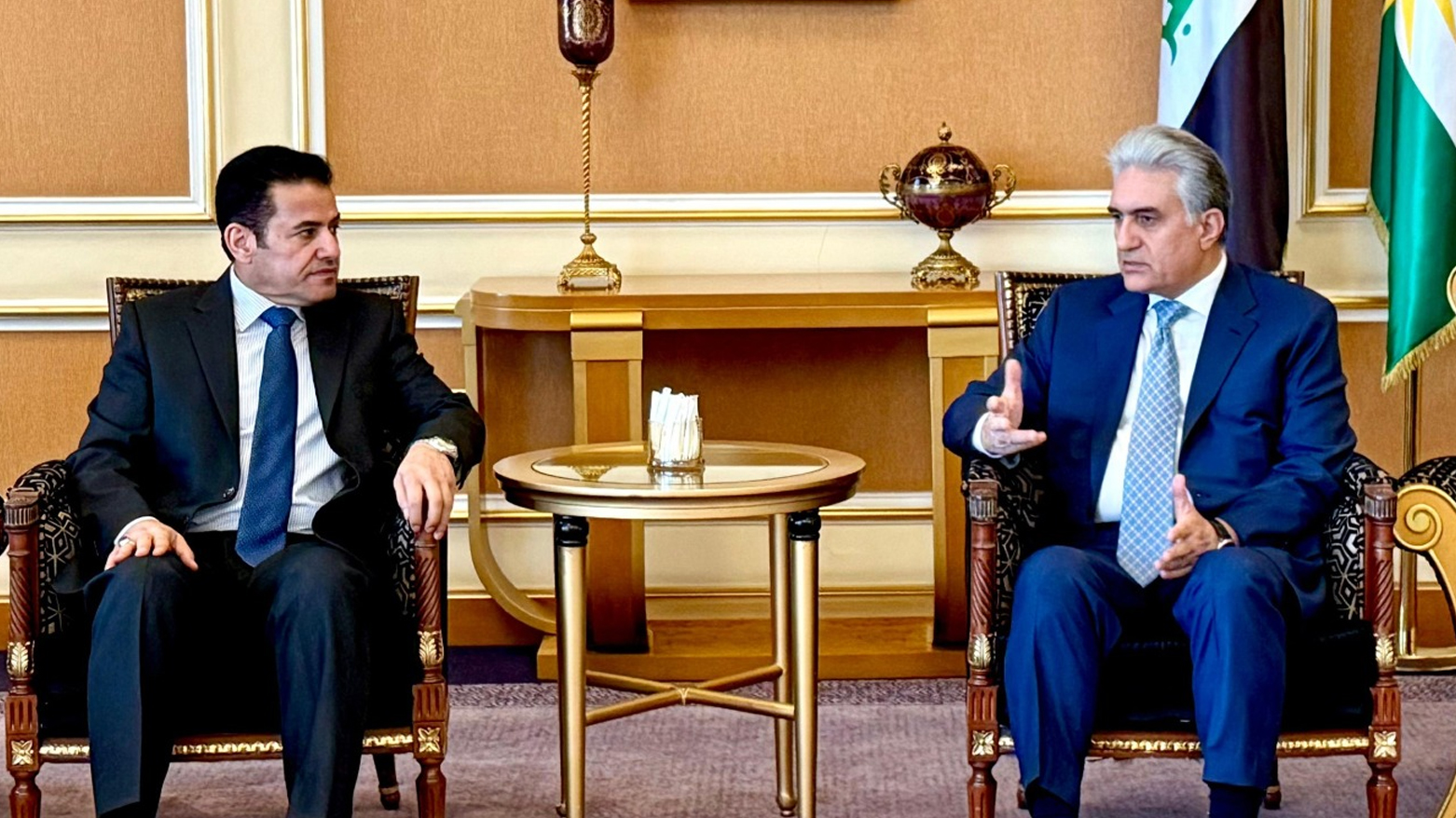Iraq’s National Security Advisor Arrives in Erbil Amid Budget Dispute
Iraq’s National Security Advisor arrived in Erbil amid tensions over budget and salaries. Kurdish leaders accuse Baghdad of stalling payments and undermining autonomy. The U.S. urges both sides to resolve disputes through dialogue to ensure stability and economic cooperation.

By Kamaran Aziz
ERBIL (Kurdistan 24) — On Wednesday, Iraq’s National Security Advisor, Qasim al-Aaraji, tasked by Iraq's Prime Minister Mohammed Shia' al-Sudani, arrived in Erbil and was welcomed by Kurdistan Region's Minister of Interior Rebar Ahmed. The purpose of the visit is reportedly to hold a series of political and security meetings with leadership in the Kurdistan Region, according to the Media Office of the National Security Advisor.
The visit occurs amid escalating tensions between Baghdad and Erbil over budgetary allocations, oil exports, governance, and financial entitlements.
Hoshyar Zebari, a member of the Executive Body of the Kurdistan Democratic Party’s Politburo, criticized the federal government on Tuesday, stating on X, “The meetings of Iraq's presidencies, ministers, and committees are only for delaying commitments.”
He further charged that “Al-Sudani's government is evading its commitments under the pretext of technical details,” emphasizing that al-Sudani “has the full authority to immediately disburse the Kurdistan Region's financial entitlements.”
تهرب حكومة السيد السوداني من صرف مستحقات موظفي الاقليم من خلال اقحام الاقليم بالتفاصيل و الجزئيات الفنية عملية مفضوحة للتنصل من التزاماتها الدستورية و حقوق المواطنة المتساوية. و عقد اجتماعات الرئاسات والوزراء و اللجان تصب ايضا في المماطلة علما لديها الصلاحيات الكاملة لصرفها فورا
— Hoshyar Zebari (@HoshyarZebari) July 8, 2025
Ashwaq Jaf, a senior member of the KDP Central Committee, accused Baghdad of deliberately working to dismantle the Kurdistan Region’s constitutional framework “under the guise of legal mechanisms.” In a televised interview with Kurdistan24, Jaf stated, “Baghdad is actively working to eliminate the constitutional structure of the Kurdistan Region. What it cannot accomplish through strength, it now pursues through illegal and unconstitutional methods.”
She described Baghdad’s actions as politically motivated rather than technical or administrative, sharply condemning the continued withholding of salaries for public servants in Kurdistan as “a new form of Anfal,” referring to the genocidal campaign by Saddam Hussein’s regime in the 1980s. Jaf stressed that while the Kurdistan Regional Government has fulfilled all its obligations, “Baghdad continues to stall and evade its own responsibilities,” and called on all Kurdish parties to unite in rejecting “the plundering of the rightful financial entitlements of Kurdistan Region employees.”
Later on, the U.S. State Department spokesperson Tammy Bruce reaffirmed Washington’s commitment to resolving these long-standing disputes, particularly concerning the salary issue. “This has been a long-standing issue,” Bruce said on Tuesday. “We continue to urge both Baghdad and Erbil to resolve their issues through constructive dialogue. That has not changed—we still want that.”
She emphasized that resolving the dispute would ease tensions and send a positive signal to international investors, especially American companies, demonstrating Iraq’s openness to business. “A successful resolution would signal broader cooperation for the benefit of all Iraqis,” she said, referencing projects such as the reopening of the Iraq-Turkey pipeline and expanded energy exploration involving U.S. firms.
Bruce also underscored the strategic importance of Iraq and the Kurdistan Region in the broader U.S. vision for peace and development, adding, “I know President Trump’s vision of a peaceful world is one where anything is possible. Iraq fits into that vision—so do the Kurdish people.”
The arrival of National Security Advisor al-Aaraji and these pointed criticisms highlight the urgent need for dialogue to resolve financial disputes and preserve the stability of Iraq’s federal system.
